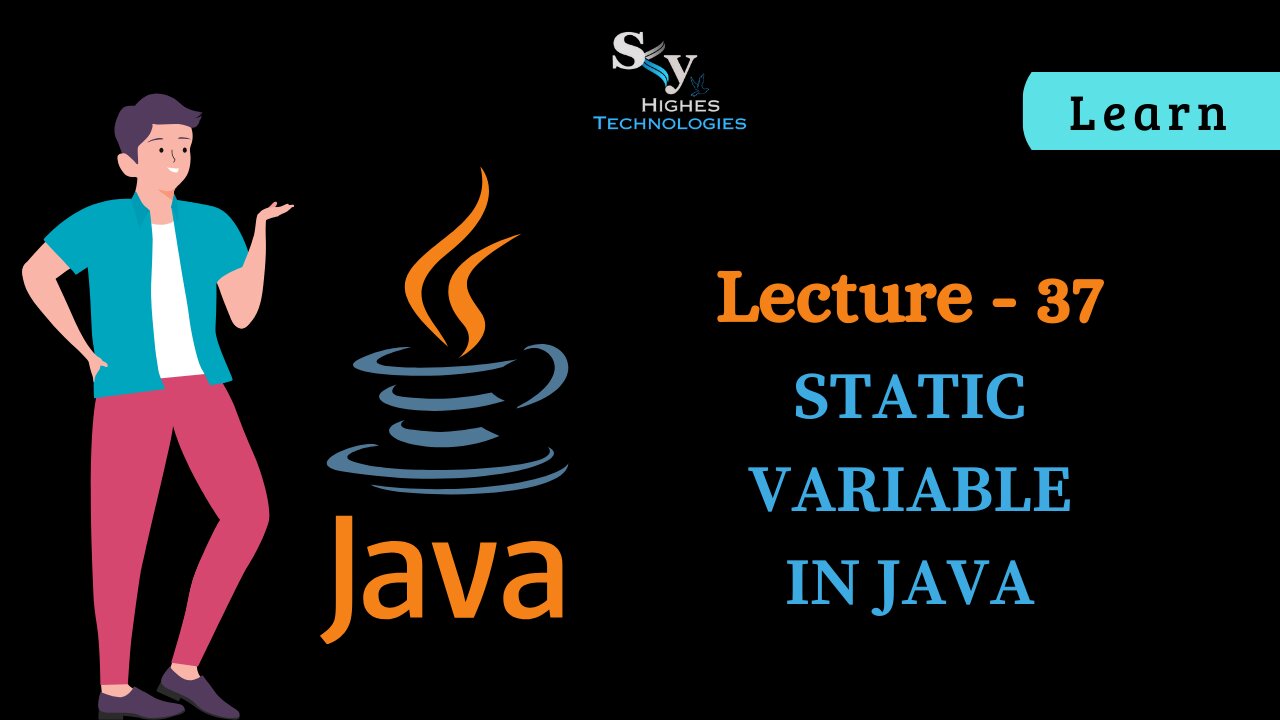Premium Only Content

#37 Static Variable in JAVA | Skyhighes | Lecture 37
Here's a comprehensive explanation of static variables in Java:
What are static variables?
Class variables: They belong to the class itself, rather than individual objects of the class.
Shared across all objects: Only one copy of a static variable exists, shared by all instances of the class.
Declared with static keyword: Use the static keyword to create a static variable within a class.
Key characteristics:
Memory allocation: Allocated in static memory when the class is loaded, not when objects are created.
Lifetime: Exist throughout the entire program's execution, even if no objects of the class exist.
Access: Can be accessed directly using the class name (e.g., ClassName.staticVariable) or through objects of the class.
Initialization: Can be initialized either directly in their declaration or within a static block.
Example:
Java
class Counter {
static int count = 0; // Static variable
public Counter() {
count++; // Increment count for each object created
}
public static void displayCount() {
System.out.println("Total objects created: " + count);
}
}
Use code with caution. Learn more
Common uses:
Constants: Used to define constants that are shared across the entire application (e.g., Math.PI, Integer.MAX_VALUE).
Counting objects: Keeping track of the number of objects created for a class (as in the example above).
Shared resources: Managing shared resources like database connections or file handles.
Utility classes: Creating utility classes that provide general-purpose functions without the need for object instantiation.
Best practices:
Use static variables judiciously, as overuse can lead to tight coupling and maintainability issues.
Be mindful of thread safety when using static variables in multithreaded environments.
Consider using static factory methods or dependency injection as alternatives for accessing shared resources.
Always initialize static variables to avoid unexpected behavior.
-
 14:11
14:11
Robbi On The Record
11 hours agoThe Trap of Identity Politics: How Division is Killing America
5.75K16 -
 1:29:23
1:29:23
Nerdrotic
10 hours ago $16.39 earnedThe Turning Point | New UFO Video with Michael Collins | Forbidden Frontier #117
74.3K27 -
 1:08:26
1:08:26
Sarah Westall
8 hours agoSuicide Pacts forming in Youth Social Media Groups - Discord, Reddit, TikTok w/ John Anthony
67.2K20 -
 2:25:31
2:25:31
vivafrei
18 hours agoEp. 281: Charlie Kirk; Routh Trial; Charlotte Train; Bolsanaro Defense; SCOTUS & MORE!
148K216 -
 2:55:38
2:55:38
Turning Point USA
9 hours agoWASHINGTON D.C. PRAYER VIGIL FOR CHARLIE KIRK
90.2K42 -
 35:54
35:54
The Mel K Show
9 hours agoMel K & Tim James | Healing is an Inside Job | 9-14-25
67.4K4 -
 3:06:33
3:06:33
IsaiahLCarter
12 hours ago $11.60 earnedCharlie Kirk, American Martyr (with Mikale Olson) || APOSTATE RADIO 028
74.9K23 -
 16:43
16:43
Mrgunsngear
16 hours ago $11.39 earnedKimber 2K11 Pro Review 🇺🇸
54.4K14 -
 13:40
13:40
Michael Button
1 day ago $3.51 earnedThe Strangest Theory of Human Evolution
49.6K24 -
 10:19
10:19
Blackstone Griddles
1 day agoMahi-Mahi Fish Tacos on the Blackstone Griddle
34.7K3